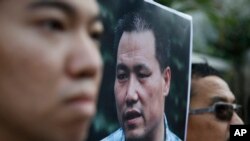A Beijing court Tuesday found prominent human rights lawyer Pu Zhiqiang guilty of “inciting ethnic hatred” and “picking quarrels and provoking trouble” but gave him a suspended three-year jail term, meaning he could be released in ten days if he decides not to appeal.
Rights groups condemned the court’s conviction as a travesty of justice, and one which showcases China’s attempts to send a warning to outspoken activists.
Guilty verdict
The second intermediate people’s court of Beijing, Tuesday, found 50-year-old Pu guilty based on several posts he had published on the Chinese social media network Weibo that were critical of the government and officials, state media reported. The comments included criticism of China’s policies in Tibet and Xinjiang.
Pu had faced up to eight years in prison, but the court said it handed down a more lenient sentence because “he has pleaded guilty and made a confession after having had stated frankly his criminal act in court,” official Xinhua reported. The guilty verdict likely means he will no longer be able to practice law.
However, his lawyer Shang Baojun said Pu has long insisted in his innocence.
During the open trial last week, Pu only expressed his willingness to apologize to anyone, who was offended by his “sharp, caustic and sometimes vulgar” comments online and insisted that his actions did not warrant the two charges. U.S. officials have also called for his release, saying he was being prosecuted under “vague charges.”
Although Pu has argued that his actions should be protected under China’s constitutional guarantees to free speech, he told the court on Tuesday that he has no intention to appeal.
Too tired to appeal
“[Pu] explained the reasons why he wouldn't appeal. First, he’s too tired after a detention of more than 20 months. He needs some rest now. And secondly, he doesn't think an appeal in China [sigh] will make a difference,” Shang said, adding that Pu will be put under residential surveillance in the coming days.
The lawyer regretted that Pu’s guilty verdict “can only be interpreted as a trend, in which, the [state’s] control over speech has worsened.”
Sharing a similar view, rights groups further expressed concerns that today’s verdict will not stand the test of history, but only sends a serious warning to dissidents in China.
“The side effect of the whole thing, about the arrest, about the accusation and the trial, etc. is very much a threat and intimidation on the freedom of expression,” said Kit Chan, a spokesperson of China Human Rights Lawyers Concern Group.
The Hong Kong-based rights group argued that the verdict goes against the Chinese authorities’ insistence the country is governed by the rule of law because no charges should have had been made in the first place against Pu for exercising his constitutional rights.
Another group, Chinese Human Rights Defenders, also condemned the guilty verdict, saying that the ruling makes a mockery of Chinese President Xi Jinping’s “rule of law” and China’s justice system.
Pu “may walk home today, but he’s not free. He has paid a heavy price for exercising his freedom of speech,” the group said in a statement, calling for an end to China’s ongoing persecution of human rights lawyers.
Shang and rights groups, nevertheless, welcomed the news that Pu, who suffers from diabetes, heart disease and high blood pressure, will be released and serve the rest of his sentence outside the jail.
Censored discussions online
Following the verdict in the morning, authorities were quick to censor discussion of Pu’s case online.
On the website Freeweibo.com, Pu’s name was the top-trending censored topic, followed by the landslide in Shenzhen.
Comments censored include “the suspended sentence doesn't mean that the rule of law is prevailed” by another rights lawyer, Ge Yongxi.
Another Weibo user wrote that “we have to understand that Pu is unwilling to plead guilty because doing so is not only dishonest to himself but also a deceit to the country, the government and the public. Now that is a true crime.”




